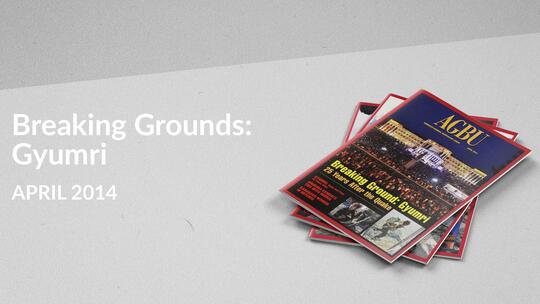His Holiness Karekin II, Supreme Patriarch and Catholicos of All Armenians struck a universal chord when he, as one of the newly-elected presidents of the World Council of Churches (WCC), put the pressing conditions of Christians in the Middle East at the top of his agenda.
Four thousand delegates gathered for the 10th assembly of the global body in November 2013 to elect eight regional presidents. His Holiness Karekin II was unanimously elected President of the Oriental Orthodox region.
Addressing the assembly, the Armenian pontiff spoke forcefully against trends of violence and extremism plaguing the Arab world and the devastating effects on the Christian communities there.
"We must speak forcefully for a universal doctrine of human lights: whether it involves the fight for life itself in Syria and Egypt; or whether it is a struggle for the right to self-determination of a free people in the Republic of Nagorno Karabakh," he said, linking the quest for survival in the Middle East to that of his own brethren in the Caucasus.
His Holiness Karekin II is the first Catholicos of the Armenian Apostolic Church to be co-president of the WCC, and the eight-year term offers a unique platform for the small nation.
During the 10-day summit in Busan, South Korea, the delegation of the Mother See of Holy Etchmiadzin raised the issue of the rights of the people of Nagorno Karabakh Republic to autonomy during a session on stateless peoples.
The delegates of the 345 member-churches also unanimously agreed to organize a Special Minute to commemorate the victims of the Armenian Genocide on April 24, 2015, its 100th anniversary.
While the bulk of the WCC's founding churches hail from Europe and North America, the membership today reflects the full diversity of the Christian faith. The majority of the member churches hail from the developing world: Africa, Asia, Latin America and the Middle East.
The mission of the WCC, founded in 1948 in Amsterdam, is to foster interchurch relations and defend human rights, justice and peace. The Council brings together a range of denominations from more than 110 countries and territories, representing over 500 million Christians worldwide.
The Head of the Social Doctrine of Mother See, His Grace Bishop Galstanian, says the WCC offers the Armenian Church a "platform" for active engagement with fellow Christian communities, not only in terms of theological matters, but also regarding Armenian cultural, political and economic interests.
No Peace Without Justice
In his speech to the WCC delegates in November, His Holiness Karekin II further elaborated on his concern for fellow Christians: "In recent years, and with increasing frequency, we have seen them singled out for persecution by extremists—at times even because of indifference of the authorities—precisely because they are Christians.
"Since the time of the Apostles, these Christian communities—among them our fellow Armenians—have lived productively and at peace throughout the Middle East, contributing to their adopted lands," he said.
"Their treatment is a test of justice in their respective countries: a test of whether basic human rights are honored by the local authorities and the majority populations. The Christians succumbing to violence in the Middle East are the witnesses of martyrdom in our own day."
The Catholicos advocated an active stance for the delegates, saying: "It is up to us, in our native countries and through this Assembly, to unite our voices and actions to prevent similar acts of violence and contribute to the establishment of peace in the region.
"We must assert, with one voice, that the violation of these basic rights will not be tolerated in any part of the world; because without a foundation of justice and human rights, the peace we seek will be only temporary and fleeting."
The speech was delivered at a crucial juncture in the history of the Middle East. The Syrian uprising-turned-civil war is nearing its third year with over 100,000 killed and some 9 million people displaced inside and outside the country. Christians throughout the Arab world are bracing for the repercussions of the divisive conflict, and many are recalculating their future in a tumultuous region.
Bishop Galstanian noted that the Council is taking concrete steps to help bring peace to the Middle East, engaging in the region and working to create opportunities for cooperation and dialogue.
While the WCC does not possess "powerful levers on political authorities; it invites, urges, warns and stresses the high value of peace among people," said Bishop Galstanian. Meanwhile, he added, "diverse discussions are being planned among different parties to examine what resources can be invested toward peace and how the lives of those suffering can be recovered."
Asked whether Christians should remain in Syria despite the bloody conflict, Bishop Galstanian emphasized that while it is tragic to see the exodus of Christians, and particularly Armenians from the Middle East—the cradle of Christianity—at the end, it is the choice of the suffering people to make the best decisions for themselves and their families.
"As a Church, our only wish is to see our nation safe and protected wherever they reside," he said.






